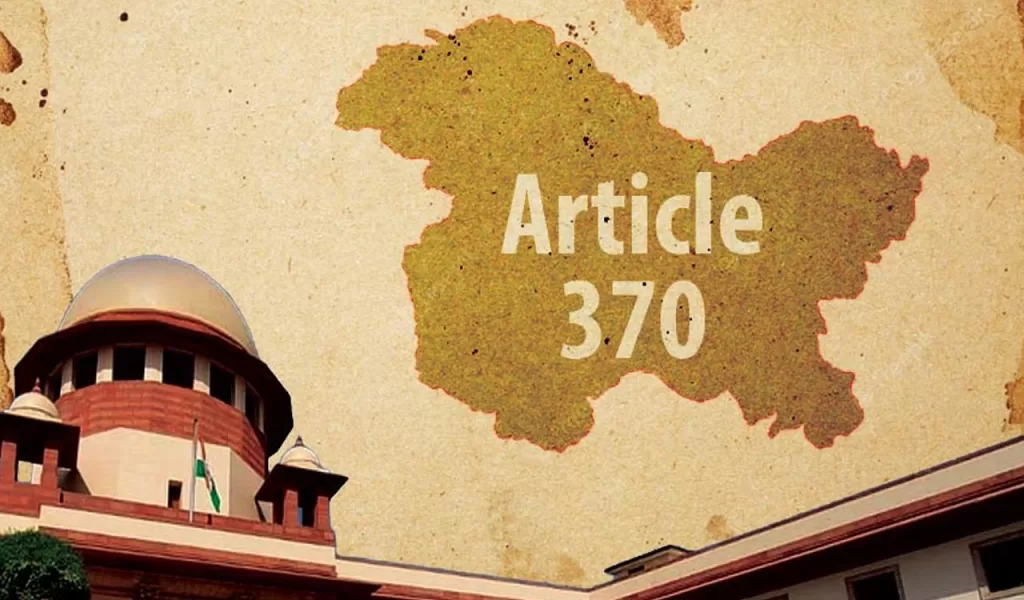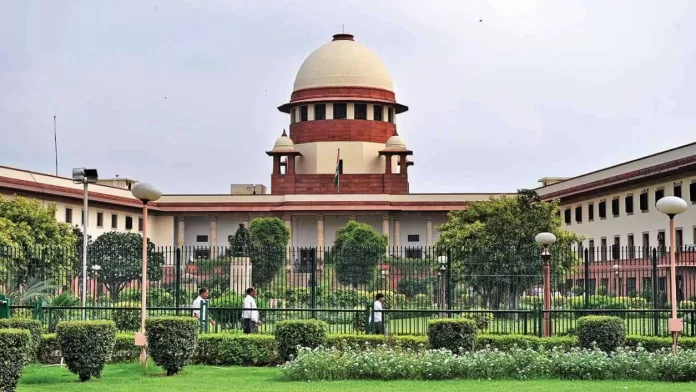I often eulogize and wish to refer to the phrase, ‘Stairway to Heaven’ to the beauty and bounties of Kashmir. The phrase incidentally is also part of a couplet of British singer Robert Plant’s song. That is how one can mesmerize God’s territory on Earth, as it is referred to! But when it turns to realpolitik in the post-Colonial era, the state has nursed a tale of broken promises. The Indian Supreme Court’s decision on December 11, 2023 has put the cart before the horse, plausibly denying a logical solution to the territorial dispute in the foreseeable future.
It was a pro-status quo verdict and has come as a shock for not only the Kashmiris, on both sides of the divide, but also for a plethora of petitioners in India’s egalitarian civil society, who wanted to see restoration of the special status to the state of Jammu & Kashmir as enshrined in the Indian Constitution. It generally marked skepticism for Indian democracy as the judicial review found it appropriate to uphold a partisan-political strategy bulldozed in Lok Sabha on the brute strength of pro-Hindutva believers, which incidentally negated the hallmarks of secularism and fair-play that were promised to the inhabitants of the disputed state way back in 1948.
The honourable bench under learned Chief Justice D.Y. Chandrachud, unnecessarily stirred a controversy by heralding Indian government’s forceful measures aimed at integrating Jammu and Kashmir as an ‘integral’ part of India. The exalted judges could have limited themselves to the veracity of BJP government’s act and by restoring Article 370 and 35-A could have done a great service to rule or law, which was in conflict with a biased theory of petty politics. But that was not the case and both the constitutional tools were scrapped out-rightly.
Let us briefly analyze as to what are the salient features of the judgment
0 The court ruled that Article 370 was a temporary provision and, thus, was struck out.
0 It Upheld the Jammu and Kashmir Reorganization Act, 2019, to the extent it carved out the Union Territory of Ladakh out of the State of Jammu & Kashmir.
0 It remarked that the views of the State Legislature regarding the proposed “reorganization” are recommendatory in nature, and “Not binding” on the Parliament.
0 The unanimous decision called for “Restoring the Statehood of Jammu & Kashmir”, and holding of elections by September 2024.
0 The Chief Justice observed that the BJP government “did not overreach its powers” when it revoked autonomy of Jammu and Kashmir on August 5, 2019.
0 The bench said Article 370 was only meant to be “temporary” after the region’s accession to India after Independence and was therefore no longer valid in the current circumstances.
0 Article 370 was termed as “asymmetric federalism,” and ordained that the Indian Constitution should apply fully to the state of Jammu and Kashmir.
0 And, last but not least, “Jammu and Kashmir “did not retain any sovereignty” after accession to India.
The decision, in other words, was one step forward and two steps back for the cherished civil polity of India.
One step ahead because it showed the way to the ruling coterie and all those who believe in jumping over the gun that extra-constitutional steps taken in exigency can be ordained. It was, indeed, a first of its kind ‘law of necessity’ for Indians!
Two steps back because it has once again reignited an old debate whether India is a Union of States or does the Constitution envisage it as Federal? The lack of clarity in the judgment will keep jurisprudents, politicians and civil society on brink for times to come.
A catharsis of the decision from an independent perspective reveals that the jury had penned the decision on many assumptions that, otherwise, were neither part of the prayer nor were desired from the superior judiciary.
One the proclamation that Article 370 was a “temporary” provision until the J&K Constituent Assembly was disbanded, and after which the state would have been fully integrated, defies logic. Reason: To deem the provision to be temporary would amount to challenging the constitutionality of Jammu and Kashmir’s integration.
Two Article 370 was meant to enshrine rights and protections for the Kashmiris, including their own constitution and flag. Abrogating and subsequently scrapping it has altered the demographic canvas of the held state, and is a great disservice to its people.
Three as an aftermath, the contract between the Union and State stands ruptured.
Four BJP’s “majoritarian prejudice” was sanctioned over legality, and it amounted to disregarding the constitution.

Pakistan’s Perspective
0 India has not only shot itself in the foot, but has also snubbed International Law as the decision raises acute concerns for the region and the standing of international institutions.
0 The decision is simply ‘unconstitutional’ and contrary to United Nations Security Council resolutions.
0 it is also against the principles of two key bilateral agreements i.e. the Simla Accord 1971 and Lahore Declaration, 1999. The Simla consensus pledged that “neither side shall seek to alter (the Line of Control) unilaterally, irrespective of mutual differences and legal interpretations.” And, at Lahore it was reiterated that an “environment of mutual confidence” shall not be derailed.
It can be argued that the December 11’s scrapping decision, close on the heels of August 5, 2019, abrogation stunt, were not the first deviations by India.
In fact, way back in 1953 when the government of Farooq Abdullah was dismissed by Prime Minister Jawaharlal Nehru and the state’s autonomy was usurped, Article 370 since then had attained the status of a Trojan horse.
The myth of autonomy since then onwards was at the mercy of installing puppet government in the held state on the premise of rigging and meddling on the part of the Union Government in Delhi through its Governor. Article 370, thus, was a charade as the real power rested with the South Bloc, New Delhi.
The scrapping of Article 35A and 370 by the superior judiciary has ‘legitimized’ interventions from the Centre, and would surely lead to more apartheid in the region.
Kashmiris for the last four years, since 2019, had been penalized in the form of denial of rights, and a blatant encroachment from fellow Indians who were scot-free to buy properties, and even the right to vote. This had infringed the locals of their ‘secured’ rights in the educational and employment arenas. Such a policy is on the lines of ‘Israeli Settlement Policy’ on the lands of Palestinians, and hints at a mindset nexus between India and Israel.
India, however, has created more problems for itself in the disputed state as the people across the country, irrespective of their nationalism, have taken this surrogate decision with a pinch of salt. The scrapping of Article 370 has alienated Indians, and it is argued that Delhi by acting on brute force of political vendetta has defaced its own constitution, and unilateral measure speaks high as to how much value is there for the States and the promised autonomy.
It is a million dollar question, whether the Congress or parties that purport federalism and adherence to the spirit of the constitution will go back for a review appeal, or promise an autonomous statehood for Kashmiris? Likewise, it remains to be seen to what extent secular political parties in 2024 general elections come to oppose the BJP’s stance that the “J&K issue has been resolved and the region integrated in India.” If BJP’s policy on Kashmir is not rolled back, and the decision questioned in all sincerity, it would simply mean that India has no regard to foreign relations and its commitments and Zionized in essence.
Way Forward
The only pertinent point from the December 11 decision is the call for setting up of a “Truth and Reconciliation Commission.” This is badly desired and should not be a cover-up policy under any means. Trailing on the lines of Canada and South Africa, India must go ahead to showcase its ‘democratic’ and ‘emancipation’ credentials by correcting the course of history and healing the wounds of Kashmiris. This is a must and the government must lead from the front to honour its superior judiciary, in the same spirit, as it will in the case of abiding with the scrapping of the two constitutional covenants.
What a treatise it would be if Truth and Reconciliation comes in the form of India portraying its image as an emerging world-class power and holding the UN-promised plebiscite. India has a great future ahead as a rising economic power, and a vibrant nation and geography. There are umpteenth examples of European powers who gave up irritating colonies to register themselves as progressive states. Will New Delhi follow suit? The December 11 moment is up for a historic grab.
Mahatma Gandhi, the iconic freedom fighter and Founder of India, had said: “Kashmir is the real test of secularism in India.” Time to prove him veracious.




